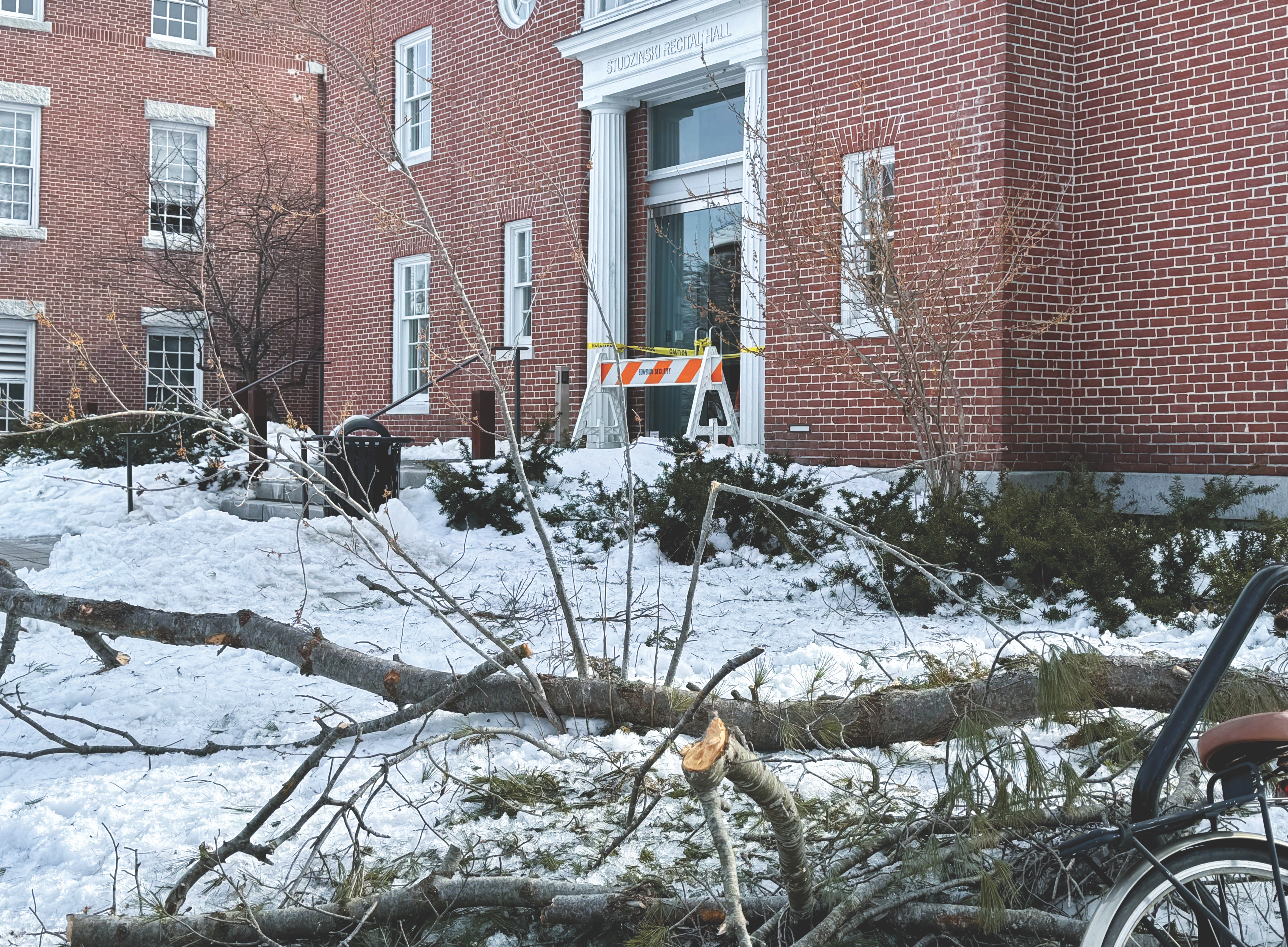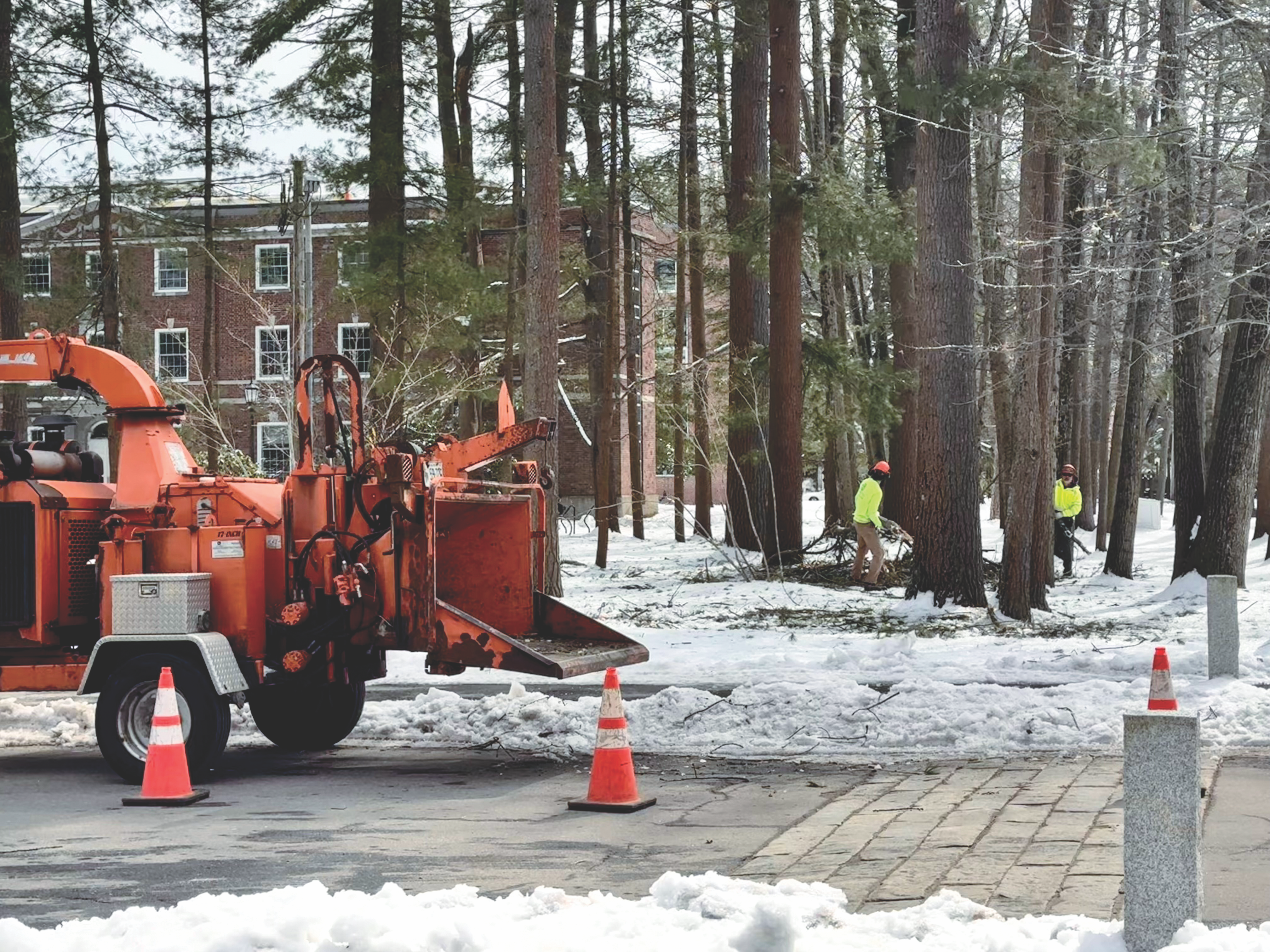Winter storm leaves Brunswick without power, Bowdoin Security and Central Maine Power comment on complications
March 29, 2024
 Joy Wang
Joy WangEditor’s Note March 29, 2024, at 12:17 p.m.: An earlier version of this article included two errors. First, Safety and Security did use manual keys after door lock batteries died, but the keys did not erode as previously reported. Second, Safety and Security responded to all calls from students locked out of their dorms, which was previously unclear and is now clarified.
Students received a cold welcome back to campus after a winter storm swept through Maine on Saturday, resulting in a three-day-long power outage on campus and in the Brunswick area. The Office of Safety and Security declared a campus-wide weather emergency on Saturday night that lasted until Monday at 11 p.m. Most buildings on campus were out of power, except for Thorne Hall and Smith Union, which can be fully generator powered. Classes were canceled on Monday, and power was fully restored to campus Monday night.
Executive Director of Safety and Security Randy Nichols said the College adhered to an Incident Action Plan set in place to mitigate the effects of power loss. A majority of these steps revolved around providing extra resources for students—around 30 inflatable mattresses, extra bedding and power cords were brought to Smith Union.
“Whenever we have a significant incident like this, we make sure everybody knows Smith Union and Thorne Dining are all available. They light up like a beacon in the dark thanks to generators,” Nichols said on Tuesday.
Even with these preparations in place, Nichols said the security team was not expecting the Office of Safety and Security phone line to go down.
“We also had to deal with the phones going in and out for a while, so we are studying that right now, see what we can do so that it doesn’t happen again. We had the analog phone line, and some people used it. So it works, and it is a good backup for us,” Nichols said.
One of the other complications due to the outage was access to student housing. Security received and responded to around 100 calls from students locked out of buildings over the weekend.
“We had a lot of students who were returning [from] break during this time. One of the other issues we ran into … was the batteries in the door lock went down with the power, … so students were locked out of dorms,” Nichols said.
While Security was tracking the storm beforehand in preparation for a power outage, Nichols said he did not expect the storm to be as aggressive as it was.
“We always are prepared and expect power outages, even when the weather is perfect because a power outage can be caused by a car crash or just an equipment malfunction or a squirrel getting into wires,” Nichols said. “The forecasting was not very clear, so I don’t think anybody thought it was going to be as bad as it turned out to be.”
 Joy Wang
Joy WangSimilar to Bowdoin Safety and Security, Central Maine Power (CMP) tracked the storm the week before it passed over Maine through internal media logical services, as well as daily updates from the National Weather Service. Jon Breed, a spokesperson for CMP, outlined the company’s response strategy for the storm.
“We started tracking this storm late in the middle of last week and making plans in the event of outages on Thursday, so we brought in 150 extra line crews starting on Friday night,” Breed said. “We also staffed up our Customer Service Center for potentially increased call volume on Saturday morning. And then we monitored the storm throughout the day on Saturday.”
CMP responded to around 800 emergency calls that it received on Saturday night about blocked roads and wires down. Its second priority was to restore the transmission system—which acts as the backbone of the electrical grid—once it was safe to send its crew out to work.
“We saw the bulk of the outages rise between 8 p.m. and midnight on Saturday. That’s when we started communicating to media,” Breed said. “But, unfortunately, during that four-hour period, it was a little too dangerous for our crews to get out there working on any kind of restoration.”
The CMP crew worked 17-hour shifts during the week to clear debris and get power lines working. CMP restored power for around 100,000 customers on Sunday and 85,000 customers on Monday. Power for the remaining estimated 30,000 customers was restored on Tuesday and Wednesday morning.
“We had a plan in place, and we watched the storm move in…. We don’t try to pinpoint exactly what’s going to happen. We try to understand what the range of options are, that could happen under scenario,” Breed said. “We did have the issues we thought we might have had coastally. And, fortunately, for that reason, we were staffed and ready to respond.”
Breed said the power outages in Brunswick were mostly caused by tree branches that broke off due to the weight of the snow and ice. CMP partnered with local municipalities, counties and towns to prioritize clearing branches. Debris removal work is expected to be finished later this week.
“I’m sure many … on Saturday night could hear those limbs cracking and popping and breaking. That’s what drove most of the damage particularly in [the Brunswick] area,” Breed said. “Down on the Harpswell Peninsula, there’s not a lot of deep soil. It’s a lot of rock with a thinner layer of topsoil, so the trees don’t have to have a really good root system to grip. When we see ice storms like this, trees will come down fairly easily.”
Ellen Salovaara ’26 said she was relieved that classes were canceled on Monday because many students were not on campus at the time.
“I also know a lot of people whose travel plans got impacted. For one of my classes, we usually have a quiz on Monday, and many people [weren’t] able to get to that class because their flights got canceled,” Salovaara said. “But I’m happy that we’re having classes [on Tuesday] because it feels a little bit like purgatory—like we’re waiting for something right now.”

Comments
Before submitting a comment, please review our comment policy. Some key points from the policy: